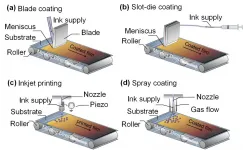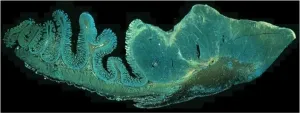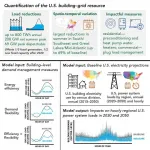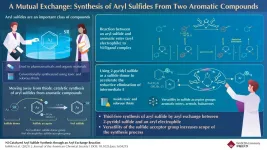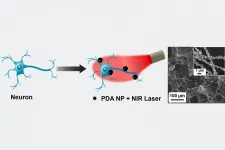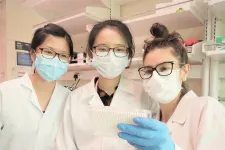INFORMATION:
See the article:
Yulong Wang, Changyu Duan, Pin Lv, Zhiliang Ku, Jianfeng Lu, Fuzhi Huang, Yi-Bing Cheng
Pringting strategies for scaling up perovskite solar cells
Natl Sci Rev; https://doi.org/10.1093/nsr/nwab075
The National Science Review is the first comprehensive scholarly journal released in English in China that is aimed at linking the country's rapidly advancing community of scientists with the global frontiers of science and technology. The journal also aims to shine a worldwide spotlight on scientific research advances across China.
Print perovskite solar cells
2021-07-21
(Press-News.org) To reach the target of carbon neutral, a transition from fossil energy to renewable energy generation is indispensable. Photovoltaic technology is considered as one of the most prominent sources of renewable energy. For decades, about 90% of global solar cell market has been dominated by silicon solar cells. Although the price of silicon solar panels decreases year by year, it is a big challenge to significantly reduce its manufacturing cost further. Hence, next-generation photovoltaic technologies are in urgent need of new materials and novel techniques. Recently, metal halide perovskite solar cells (PSCs) have attracted extensive attention from both academia and industry, due to their excellent photoelectric conversion efficiency and great commercial potential.
Metal halide perovskite materials can be easily synthesized in solution at low-temperature and deposited into thin-film through a variety of printing method. Recently, many reviews have been published on the topic of perovskite film deposition techniques/mechanisms, such as solvent engineering and additives-engineering, whereas discussions about ink engineering for printing high-quality perovskite films as well as other function layers are few.
In this article, the authors provide a systematical overview of applicable printing technologies that can be possibly used for scaling-up PSCs. The authors consider the ink engineering is the key issue to achieve high quality thin films for efficient solar cells. Therefore, they mainly focus on the perspective of perovskite precursor ink formula and additives on controlling the film formation process. They analyze the potential physical and chemical mechanisms of the nucleation and crystallization process during the printing. For the additives in the printing of PSCs, the authors discuss the effect of additives for the film formation process, the microstructure and defect population.
Moreover, they also present the technical feasibility of printing the other layers besides perovskite layers, including hole transporting layers (HTL) and electron transporting layers (ETL), which might enable a rapid and mass production of PSCs. Finally, they introduce the recent progress of roll-to-roll (R2R) printing and the stability issues of perovskite modules, and give a prospect of mass production of perovskite solar modules in the near future.
ELSE PRESS RELEASES FROM THIS DATE:
Cancer: Information theory to fight resistance to treatments
2021-07-21
One of the major challenges in modern cancer therapy is the adaptive response of cancer cells to targeted therapies: initially, these therapies are very often effective, then adaptive resistance occurs, allowing the tumor cells to proliferate again. Although this adaptive response is theoretically reversible, such a reversal is hampered by numerous molecular mechanisms that allow the cancer cells to adapt to the treatment. The analysis of these mechanisms is limited by the complexity of cause and effect relationships that are extremely difficult to observe in vivo in tumor samples. In order to overcome this challenge, a team from the University of Geneva (UNIGE) ...
Communicating about climate change: What's politics got to do with it?
2021-07-21
In the United States, climate change is controversial, which makes communicating about the subject a tricky proposition.
A recent study by Portland State researchers Brianne Suldovsky, assistant professor of communication, and Daniel Taylor-Rodriguez, assistant professor of statistics, explored how liberals and conservatives in Oregon think about climate science to get a better sense for what communication strategies might be most effective at reaching people with different political ideologies. The study was published in Climatic Change in June.
Prior studies have shown that exposing climate change skeptics, ...
Effectiveness of mRNA vaccines against the Alpha and Beta variants in France
2021-07-21
Over the past six months, the World Health Organization has categorized four SARS-CoV-2 variants as being "of concern" because they are more transmissible or may escape the immune response. They have been termed the Alpha, Beta, Gamma and Delta variants. Scientists from the Institut Pasteur, in collaboration with the French National Health Insurance Fund (CNAM), Ipsos and Santé publique France, conducted a nationwide case-control study to evaluate the effectiveness of mRNA vaccines against symptomatic forms of SARS-CoV-2 infection, be that non-variant virus or the Alpha and Beta variants. The results show that the two-dose vaccination regimen of mRNA vaccines provides 88% protection against non-variant virus, 86% against the Alpha variant and 77% against the Beta ...
Reaping the benefits: Training in rice growing system ups yields and well-being
2021-07-21
Tsukuba, Japan - Rice is the world's most commonly grown and consumed crop. It also supports lives and livelihoods, especially in low- and middle-income regions. As such, methods for securing abundant and profitable rice harvests are key in global food security.
The System of Rice Intensification (SRI) offers a repeatable, sustainable system for increasing rice yields. It brings together fundamental planting and harvesting techniques such as strategically spacing plants, minimizing water, and transplanting seedlings. These practices can be repeated in varying conditions. While SRI has been around since ...
How managing building energy demand can aid the clean energy transition
2021-07-21
Since buildings consume 75% of electricity in the U.S., they offer great potential for saving energy and reducing the demands on our rapidly changing electric grid. But how much, where, and through which strategies could better management of building energy use actually impact the electricity system?
A comprehensive new study led by researchers from the Department of Energy's Lawrence Berkeley National Laboratory (Berkeley Lab) answers these questions, quantifying what can be done to make buildings more energy efficient and flexible in granular detail by both time (including time of day and year) and space (looking at regions across the U.S.). The research team, which also included scientists from the National Renewable Energy Laboratory (NREL), found that ...
A mutual exchange: Synthesizing aryl sulfides from non-smelling, non-toxic compounds
2021-07-21
Aryl sulfide, an aromatic compound in which sulfur is attached to an aryl (a functional group derived from an aromatic ring), is found in biologically active materials effective against asthma, Alzheimer's disease, and cancer. As a result, chemists have shown a lot of interest in synthesizing aryl sulfides. Traditionally, carbon-sulfur (C-S) bond formation reactions between thiols and aryl electrophiles catalyzed by transition metals have been employed for aryl sulfide synthesis because of their high reliability. However, thiols have an unpleasant smell and are toxic. Could there be a way to synthesize aryl sulfides that avoids the ...
Cybercrime bill to rise during pandemic
2021-07-21
A new study of almost 12,000 Australians has found one-third of the adult population has experienced pure cybercrime during their lifetime, with 14% reporting this disruption to network systems in the past 12 months.
With all forms of cybercrime already costing trillions every year globally, experts from the Australian Institute of Criminology (AIC) and Flinders University say the crimes involved substantial levels of personal victimisation including direct losses as well as the high cost of preventing future attacks.
A pre-COVID-19 snapshot of the cost of 'pure cybercrime' in 2019 has found an approximate ...
Nanoparticles create heat from light to manipulate electrical activity in neurons
2021-07-21
Nanomaterials have been used in a variety of emerging applications, such as in targeted pharmaceuticals or to bolster other materials and products such as sensors and energy harvesting and storage devices. A team in the McKelvey School of Engineering at Washington University in St. Louis is using nanoparticles as heaters to manipulate the electrical activity of neurons in the brain and of cardiomyocytes in the heart.
The findings, published July 3, 2021, in Advanced Materials, have the potential to be translated to other types of excitable cells and serve as a valuable tool in nano-neuroengineering.
Srikanth Singamaneni, a materials scientist, and Barani Raman, a biomedical engineer, and their teams collaborated to develop a noninvasive technology that inhibits the electrical ...
To save a species, check its ID
2021-07-21
It's hard to save what you can't identify. That's been a problem for the endangered salt marsh harvest mouse, which is found only in the salty, brackish waters of the San Francisco Bay area. The mouse competes for space with about eight million humans, and more than three-quarters of its habitat has been eaten by development and land conversion. That loss is expected to increase amid rising sea levels.
Conserving the population has proven tricky, in part because it looks so much like another mouse in the area--the western harvest mouse--that is abundant throughout western U.S.
But scientists from UC Davis have developed a tool, a "decision ...
SMART breakthrough in detection of SARS-CoV-2 variant in wastewater
2021-07-21
Researchers from the Antimicrobial Resistance (AMR) Interdisciplinary Research Group (IRG) at Singapore-MIT Alliance for Research and Technology (SMART), MIT's research enterprise in Singapore, alongside collaborators from Biobot Analytics, Nanyang Technological University (NTU) and Massachusetts Institute of Technology (MIT), have successfully developed an innovative, open-source molecular detection method that is able to detect and quantify the B.1.1.7 (Alpha) variant of SARS-CoV-2. The breakthrough paves the way for rapid, inexpensive surveillance of other SARS-CoV-2 variants in wastewater.
As the world continues to battle and contain COVID-19, the recent identification of SARS-CoV-2 variants with higher transmissibility and increased severity has made the development ...
